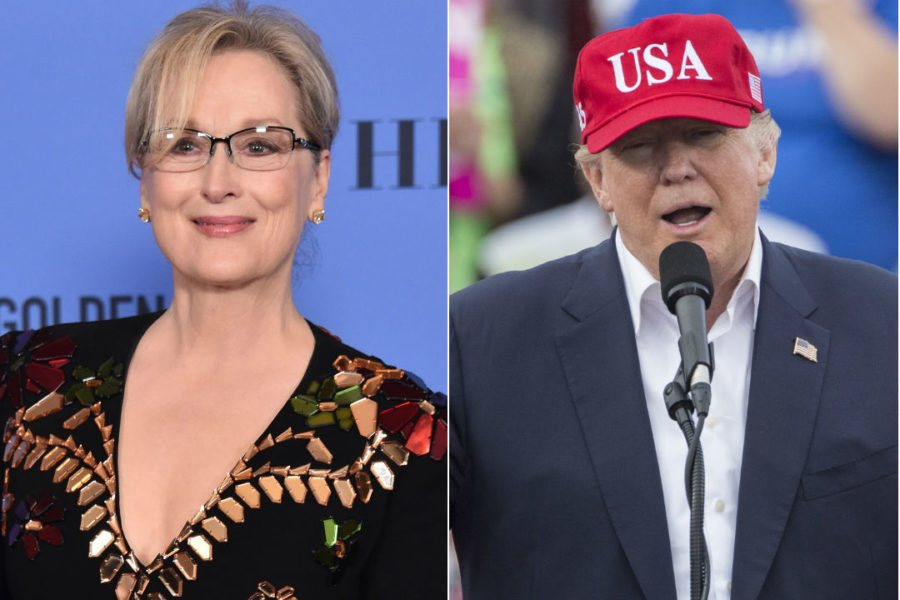Do politics and the arts mix well?
Tomi Lahren, the newfound mascot for conservatives, was triggered by Meryl Streep’s Golden Globes acceptance speech.
“It might be warm in LA, but make no mistake it’s raining snowflakes. Out of touch, whiny, overpaid SNOWFLAKES!” tweeted Lahren.
Streep boldly began her speech by stating that without foreigners in Hollywood, all that people would have to watch is mixed martial arts and football– to which Lahren tweeted that “we are just fine with watching football.”
Then, Streep equated Trump’s imitation of the disabled New York Times investigative reporter Serge Kovaleski to a performance, but “not because it was good”: but rather, because it “sank its hooks in [her] heart.”
Not only did it bother her because it was rude, but because it was done by a man running for the highest office in the country. Like many, she believes that a president should serve as a role model for his or her citizens.
“Disrespect invites disrespect, violence incites violence. And when the powerful use their position to bully others, we all lose,” said Streep.
By interweaving politics and the arts, Streep ultimately discussed the importance of having a free press. In order for it to hold those in power accountable, she pleaded her contemporaries to support the Committee to Protect Journalists.
Streep’s concerns to protect free press are valid considering not only the fake news epidemic but that Trump’s recent actions have further blurred the lines between real and fake news. At his first press conference as president-elect, Trump both stated that he has “long been a supporter of a free and independent press” and refused to speak with CNN reporter Jim Acosta, calling the network “fake news.” Considering that a formidable portion of the electorate relies on Trump as a news source, what he says should not be taken lightly; moreover, what a free press should do cannot be dismissed either.
So why did Lahren say that Streep is “out of touch” and Trump say that she is “overrated”? The freedom of speech and the press are enshrined as a First Amendment right. There is nothing more American than the ability for its citizens to criticize its government.
So why was there a conservative backlash against Streep, and why do conservatives hold Hollywood with such scorn in general?
Simple: people on all sides of the political spectrum have little desire to listen to views that differ from their own. Hence, the creation of “safe spaces” on college campuses on the left and the inundation of alt-right “news” sites on the right.
The right has demonized Hollywood for being filled with liberal actors and actresses. Streep’s speech simply added fuel to that fire. However, polarization between artists and politicians is no new phenomenon.
During the 1960s, events such as the Civil Rights Movement and the Vietnam War created a distinct rift between progressives and reactionaries. Artists such as Bob Dylan and the Rolling Stones had liberal political views (sound familiar?). Consequently, their music that was political in content was banned.
The following events occurred in 1968: “An El Paso, Texas, radio station bans all Bob Dylan records because ‘it is too difficult to understand the lyrics.’ The station management fears that the lyrics may contain politically objectionable or lewd messages…During the National Democratic Convention, Chicago mayor Richard Daley orders local radio stations to stop playing the Rolling Stones’ single “Street Fighting Man” in anticipation of rioting that occurred during the convention,” said Meredith E. Rutledge-Borger in an article for the Rock and Roll Hall of Fame.
Americans pride themselves in their attempt to learn from errors of the past and resolve not to repeat them; take the notion that America is a post-racial society because of the election of the first African-American president. While the country has largely upheld the Civil Rights Act of 1964, which outlawed discrimination on the basis of race, color, religion, sex, or national origin, it has regressed from the Voting Rights Act of 1965. In 2013, the Supreme Court weakened the law. This resulted in several states’ revision of their voting rules, particularly including those in the South.
“Those changes included new voter ID requirements, as well as closing or changing locations of hundreds and likely thousands of polling sites, shifts that used to require federal approval,” said Jaweed Kaleem of the Los Angeles Times.
This is significant because not only as Americans but as humans; we are predisposed to repeat our mistakes. Perhaps we already are; the President continuously criticizes those whose views differ from his.
Beyond the implications of this development being frightening, it is hypocritical. When Duck Dynasty star Willie Robertson spoke at the 2016 Republican National Convention, there was no conservative reaction against “out of touch stars” from participating in the political process. In fact, their nominee is probably best known for his tagline “you’re fired” on the Celebrity Apprentice!
Ultimately, the adverse response to Streep’s speech embodied the unwillingness of the right to listen to “Hollywood elites.” If Robertson can speak at the RNC, then why couldn’t Streep use the Golden Globes as a platform for her political views?
To say that those in Hollywood shouldn’t share their views because of their career choice is un-American; it is their First Amendment right.
In fact, it would be pretty difficult for stars to refrain from discussing politics– they impact nearly every facet of our lives, whether it be the water we drink, the school we attend, or the rights we have.
The only issue in having a celebrity that is too involved in politics is running the risk that someone inexperienced and unknowledgeable ends up in power. Wait, we already did that…

